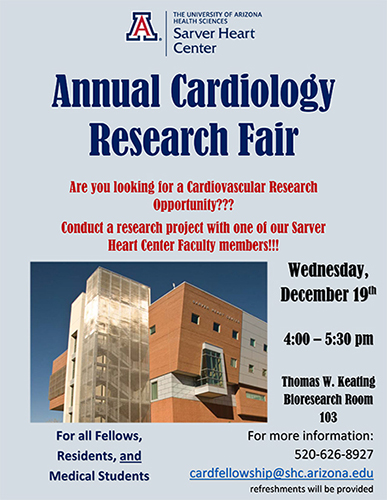 The Thomas W. Keating Building, Room 103, at the University of Arizona BIO5 Institute will play host to the next Cardiology Research Fair on Wednesday, Dec. 19, 4-5:30 p.m.
The Thomas W. Keating Building, Room 103, at the University of Arizona BIO5 Institute will play host to the next Cardiology Research Fair on Wednesday, Dec. 19, 4-5:30 p.m.
The event is sponsored by the UA Division of Cardiology and UA Sarver Heart Center.
This is the fourth research fair for Cardiology over the course of the past three years. It is open to any trainee—fellows, residents, post-docs—or medical student who is looking for a mentor and is interested in cardiovascular disease research.
The fair will continue with its “speed dating” format, offering participants an opportunity for one-on-one conversations between investigators with multiple research interests, trainees and students.
Click here to add this event to your personal schedule (via iCal, MSOutlook, Google or Yahoo! calendar).
To view the flyer for this event, see this link: ![]() cardiology-research-fair_sarver-heart-center_12-19-2018_flyer.pdf
cardiology-research-fair_sarver-heart-center_12-19-2018_flyer.pdf
Among faculty members expected to attend and their research themes are:
Khadijah Breathett, MD:
“Health Services Research: Disparities in Cardiovascular Disease”
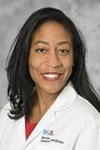 Cardiovascular disease is the leading cause of death. Cardiovascular disease disproportionately affects women and racial/ethnic minorities. Multiple factors contribute to these statistics (i.e. patient lifestyle, social determinants of health, health policy, and bias).
Cardiovascular disease is the leading cause of death. Cardiovascular disease disproportionately affects women and racial/ethnic minorities. Multiple factors contribute to these statistics (i.e. patient lifestyle, social determinants of health, health policy, and bias). - Dr. Khadijah Breathett is using mixed-methods, quantitative (big data) and qualitative analyses, to improve cardiovascular health for disadvantaged populations.
- Fellows can explore a variety of questions to address disparities in cardiovascular disease.
Steven Goldman, MD, Jordan Lancaster, PhD, and Jen Koevary, PhD:
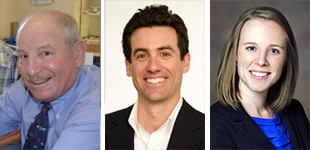 “Goldman Lab and Its Focuses”
“Goldman Lab and Its Focuses”
- Our lab focuses on understanding the pathophysiology of disease of cardiac conditions such as heart failure and developing and evaluating therapeutics for cardiac disease.
- We are currently working on tissue-engineered therapeutics to treat diseases and injuries to human muscle. We have a tissue-engineered heart graft developed to treat heart failure and is currently in the pre-clinical development phase. This graft contains induced pluripotent stem cell derived cardio myocytes and neonatal fibroblasts seeded or co-cultured on a biodegradable scaffold and implanted on the surface of a damaged heart. The patch increases blood flow to the damaged heart, improves cardiovascular function, reverses maladaptive LV remodeling and enhances electrical activity through the scar tissue. We are proposing this as the world’s first off-the-shelf allogeneic tissue-engineered product for treating heart failure.
- Using this same bioengineered graft, we are exploring use of this as an engineered piece of cardiac tissue on which we can explore drug development/drug toxicity in human cardiac cells before administering drugs to animals or humans. To-date, we have found that our graft responds to drugs just as the heart would. One focal point of this work is to determine if we can use the graft to screen for drug that prolong the QT interval and predispose to torsades de pointes.
- Our laboratory has a number of young investigators i.e., undergraduate students, medical students, PhD candidates and post docs. We encourage a learning atmosphere in the lab for both the senior scientists and the young investigators.
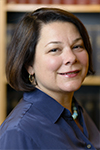 Nancy Sweitzer, MD, PhD:
Nancy Sweitzer, MD, PhD:
“Heart Failure Trials Research”
- Dr. Sweitzer's research program focuses on interaction of the dysfunctional heart muscle in heart failure with other body systems to better understand how to improve symptoms and organ function in heart failure patients.
- She has done extensive work on the physiology of heart failure with preserved systolic function, a disease that disproportionately affects elderly women.
- She has led and collaborated on numerous studies sponsored by the National Institutes of Health as well as studies supported by industry and academic sponsors.
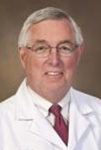 Karl Kern, MD:
Karl Kern, MD:
“Research Opportunities with the UA Sarver Heart Center Resuscitation Research Group”
- INTCAR Post- Resuscitation Registry - International Cardiac Arrest Registry
- Dr. Kern's research interests are in cardiopulmonary resuscitation and coronary blood flow.
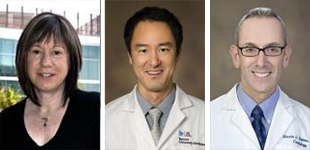 Others whose research and or labs will be represented include: Carol Gregorio, MD; Julia Indik, MD, PhD; Toshinobu Kazui, MD, PhD; and Marvin Slepian, MD.
Others whose research and or labs will be represented include: Carol Gregorio, MD; Julia Indik, MD, PhD; Toshinobu Kazui, MD, PhD; and Marvin Slepian, MD.
The fair’s primary sponsor is 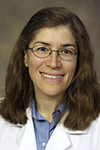 Dr. Indik (at right), program director, UA Cardiovascular Disease Fellowship, and the Flinn Foundation and American Heart Association Endowed Chair in Electrophysiology and Heart Disease Research at the UA College of Medicine - Tucson.
Dr. Indik (at right), program director, UA Cardiovascular Disease Fellowship, and the Flinn Foundation and American Heart Association Endowed Chair in Electrophysiology and Heart Disease Research at the UA College of Medicine - Tucson.
There are four fellowship programs in cardiology at the UA Division of Cardiology, including the Cardiovascular Disease Fellowship, Interventional Cardiology Fellowship, Advanced Heart Failure and Transplant Cardiology Fellowship and Clinical Cardiac Electrophysiology Fellowship. Learn about all the fellowships here.
Cardiology is one of 14 divisions in the UA Department of Medicine, one of six original and the largest department at the college.
For more information, contact cardfellowship@shc.arizona.edu or (520) 626-8927.
ALSO SEE:
“Speed Dating for Mentors in Cardiovascular Studies Focus of Sarver Research Fair, Nov. 29” | Posted Oct. 17, 2017

